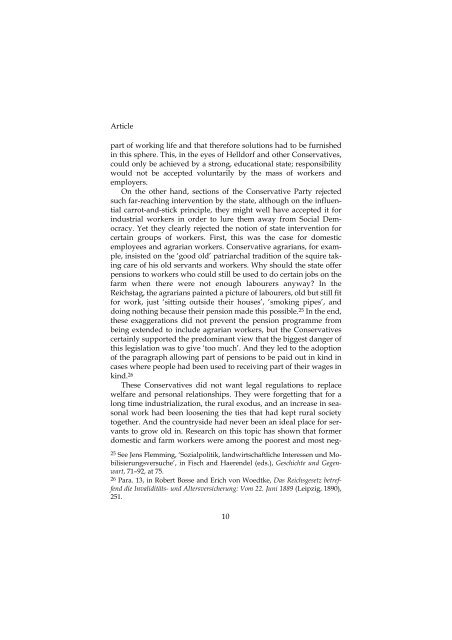Download - German Historical Institute London
Download - German Historical Institute London
Download - German Historical Institute London
Create successful ePaper yourself
Turn your PDF publications into a flip-book with our unique Google optimized e-Paper software.
Article<br />
part of working life and that therefore solutions had to be furnished<br />
in this sphere. This, in the eyes of Helldorf and other Conservatives,<br />
could only be achieved by a strong, educational state; responsibility<br />
would not be accepted voluntarily by the mass of workers and<br />
employers.<br />
On the other hand, sections of the Conservative Party rejected<br />
such far-reaching intervention by the state, although on the influential<br />
carrot-and-stick principle, they might well have accepted it for<br />
industrial workers in order to lure them away from Social Dem -<br />
ocracy. Yet they clearly rejected the notion of state intervention for<br />
certain groups of workers. First, this was the case for domestic<br />
employees and agrarian workers. Conservative agrarians, for example,<br />
insisted on the ‘good old’ patriarchal tradition of the squire taking<br />
care of his old servants and workers. Why should the state offer<br />
pensions to workers who could still be used to do certain jobs on the<br />
farm when there were not enough labourers anyway? In the<br />
Reichstag, the agrarians painted a picture of labourers, old but still fit<br />
for work, just ‘sitting outside their houses’, ‘smoking pipes’, and<br />
doing nothing because their pension made this possible. 25 In the end,<br />
these exaggerations did not prevent the pension programme from<br />
being extended to include agrarian workers, but the Conservatives<br />
certainly supported the predominant view that the biggest danger of<br />
this legislation was to give ‘too much’. And they led to the adoption<br />
of the paragraph allowing part of pensions to be paid out in kind in<br />
cases where people had been used to receiving part of their wages in<br />
kind. 26<br />
These Conservatives did not want legal regulations to replace<br />
welfare and personal relationships. They were forgetting that for a<br />
long time industrialization, the rural exodus, and an increase in seasonal<br />
work had been loosening the ties that had kept rural society<br />
together. And the countryside had never been an ideal place for servants<br />
to grow old in. Research on this topic has shown that former<br />
domestic and farm workers were among the poorest and most neg-<br />
25 See Jens Flemming, ‘Sozialpolitik, landwirtschaftliche Interessen und Mo -<br />
bi lisierungsversuche’, in Fisch and Haerendel (eds.), Geschichte und Gegen -<br />
wart, 71–92, at 75.<br />
26 Para. 13, in Robert Bosse and Erich von Woedtke, Das Reichsgesetz betreffend<br />
die Invaliditäts- und Altersversicherung: Vom 22. Juni 1889 (Leipzig, 1890),<br />
251.<br />
10













